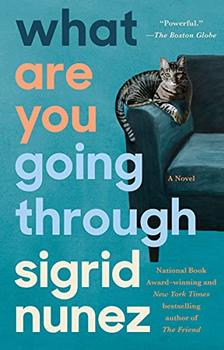Summary | Excerpt | Reading Guide | Reviews | Beyond the book | Read-Alikes | Genres & Themes | Author Bio

In One Night Two Souls Went Walking, we follow a young interfaith chaplain as she carries out her nightly duties on a hospital ward, easing patients through their final moments and comforting loved ones in their newfound grief. She was drawn to the job through her fascination with the concept of souls – how they are formed, where they reside, and whether or not they ever truly leave. Though not hugely plot driven, we do see glimpses of the ways her unwavering dedication to this role has impacted her personal relationships, and through subtle hints of magical realism, the emotional toll it can take to so often be forced to say goodbye.
Despite the melancholy subject matter, the novel has a gentle quality that mirrors the narrator's characterization. That said, Cooney hints at a complexity beyond simple kindness, showing us the white lies she is often compelled to tell in order to ease the woes of the dying so they may pass in peace. It's here that the author throws up the biggest philosophical questions, though never in a way that feels dry. In their final moments, patients wish to metaphorically bear their souls: some seek comfort, some wish to be absolved of guilt, while others simply need permission to let go. But almost all wish to reflect on the people and moments that meant the most to them in life. Is it this then – the lives we've lived and the memories we've made – that amalgamate to form the essence of who we are? Or is the soul a more literal entity that drifts free of our bodies when we die, perhaps even watching over those we've left behind? The book flirts with the uncanny just enough to suggest the possibility of the latter, but always remains grounded by the gravity of the chaplain's work.
The repetition of meeting a character, learning their history, and saying goodbye to them as they pass on certainly captures how relentless and emotionally taxing the chaplain's work is, but it also means the novel can feel somewhat fragmented at times, reading more like a collection of interlinked short stories. At first, it can be frustrating to lose enigmatic characters just as we begin to feel invested in them; to so quickly have the focus shift to someone else. But when you consider how closely this reflects the reality of the chaplain's situation, you realize what a clever structural device it is.
It is quite the achievement for a book to take on themes as huge as humanity, memory and faith while remaining so intimate in tone and scope. For all the theories on the true nature of the soul it poses – and the interesting debates these interpretations are likely to spark – the book remains certain of one thing: what unites us all in death is a desire not to feel alone. Though it may come at great personal cost, it is the gift of companionship the chaplain is determined to give to all those who ask it of her.
![]() This review
first ran in the November 18, 2020
issue of BookBrowse Recommends.
This review
first ran in the November 18, 2020
issue of BookBrowse Recommends.

If you liked One Night Two Souls Went Walking, try these:

by Sigrid Nunez
Published 2021
The New York Times-bestselling, National Book Award-winning author of The Friend brings her singular voice to a story about the meaning of life and death, and the value of companionship.

by Marina Kemp
Published 2020
In this haunting novel, a young nurse forms an unlikely connection with the elderly man she cares for, and finds herself confronting the guilt she carries from her past.
Anagrams
Click Here to find out who said this, as well as discovering other famous literary quotes!
Your guide toexceptional books
BookBrowse seeks out and recommends the best in contemporary fiction and nonfiction—books that not only engage and entertain but also deepen our understanding of ourselves and the world around us.